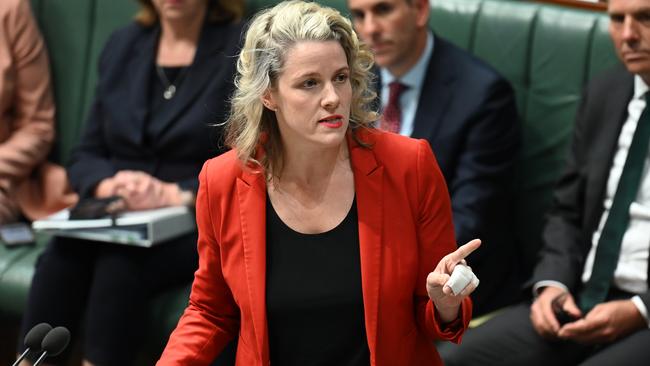James Campbell: Government still courting disaster over border protection
While ‘we’re not really in charge here, the courts are’ might be a winning line in domestic politics, it’s hard to think of a better argument for people smugglers too, writes James Campbell.
Opinion
Don't miss out on the headlines from Opinion. Followed categories will be added to My News.
It’s been four months since the High Court blew a hole in the hull of the nation’s border-protection policies and it’s becoming increasingly clear that far from being repaired, the scale of the damage has still to be assessed.
At short notice on Friday morning, Canberra press gallery journalists were summoned to a briefing from the ABF’s top brass, Home Affairs Minister Clare O’Neil and Immigration Minister Andrew Giles.
The briefing was a nice change of pace from the government, showing it understands it needs to get ahead of things rather than waiting to be mugged by events.
Most urgently, the thing it needs to lay groundwork for is the coming High Court case that will decide whether about 150 more people in immigration detention are also released.
No one should predict how these things will turn out, but the government is “not sanguine” about its chances of victory.

But it isn’t just next month’s court case that’s causing the government a headache — the cases flowing from the High Court’s NZYQ decision and the legislation that has since been put in place are likely to roll on for another three years.
Which perhaps explains why on Friday, O’Neil told The Weekend Australian: “The High Court has drawn new boundaries around the powers of the executive and parliament. And there continues to be uncertainty about exactly where those boundaries will ultimately be drawn when it comes to key aspects of migration law.”
Translation: “It ain’t me – the judges made this mess and they’re not finished yet.”
Is the minister right? The answer to that question is complicated.
On the face of it, the answer is “yes, it wasn’t the government that ruled indefinite detention was a no-no, it was the court”.
But if you talk to people on both sides of politics, there’s a bit more to it than that.
Though the government was angered in November at the way the High Court handed down its decision on the spot without giving its reasons, the outcome was no surprise.
Apparently for years it had been a fairly well established view among the learned friends that whenever the High Court got a chance to rule on it, it was bound to knock out indefinite detention for criminals who cannot be deported either to their country of origin or a third party.
Which is why earlier governments had been careful to make sure the court never got to hear a case that gave them that opportunity, even going so far as to release people they would have preferred stayed locked up. In other words, to protect the community from a flood of dangerous foreign criminals, it was from time to time necessary to release dangerous foreign criminals into the community.
Madness, I know, but the law is the law. So why didn’t Giles just follow the same procedure in NZYQ, that is to say, hold his nose while granting a visa? The opposition hints darkly the reason is that as a socialist Left Victorian who opposed boat turn-backs, Giles has never believed in indefinite detention and knew exactly what he was doing when he allowed the case to reach the High Court.
A more charitable view is that no immigration minister under the sun could release a child rapist and hope to survive politically.
As I said, the purpose of Friday’s briefing seems to have been to prepare us for the news that the nasties released so far are a good chance to end up being just the first batch. The management of these people will be a matter for Giles.
O’Neil’s problem is that in telegraphing that uncertainty here is likely to last years, she is cutting across her main job, which is deterring more asylum seekers from making the dangerous journey by boat.
So while “we’re not really in charge here, the courts are” might be a winning line in domestic politics, it’s hard to think of a better argument for people smugglers too.
Got a news tip? Email james.campbell@news.com.au



